The latest Taking the Pulse of the Nation survey shows that one in three Australians remain hesitant about being vaccinated against COVID-19. Wave 34 of the survey was in the field from (31 May - 5 June 2021).
One in three Australians remain hesitant about being vaccinated against COVID-19
To date, 21 percent of adult Australians report having received the vaccine and another 50 percent want to be vaccinated. The rest are either unwilling to be vaccinated (16 per cent) or don’t know whether they want to be vaccinated (13 per cent). Despite the current Victorian lockdown and the presence of more contagious strains of the virus in the community, vaccine hesitancy has not changed.
Figure 1. Which Vaccine would you prefer: Pfizer? AstraZeneca? Any vaccine will be fine?
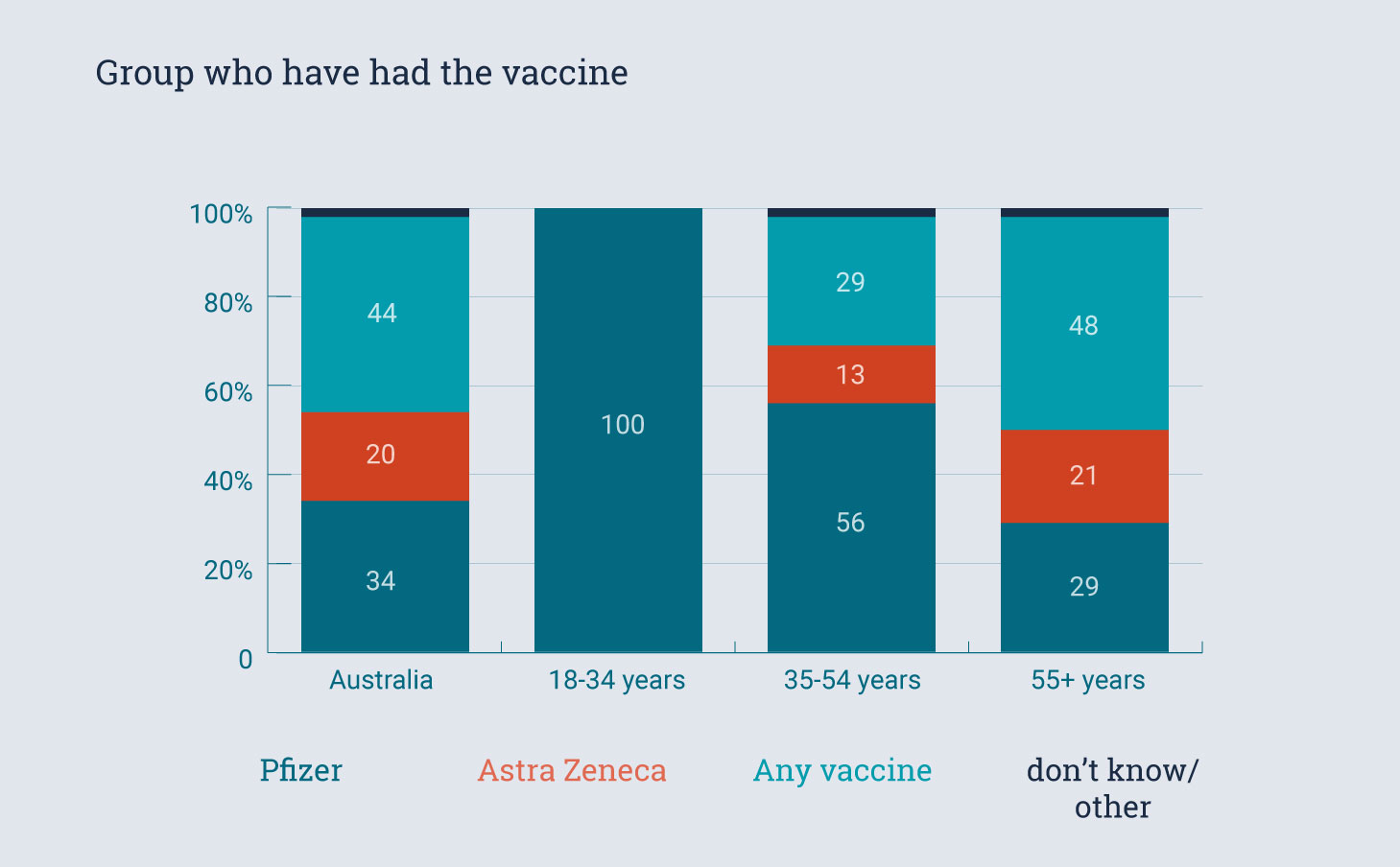
For the group who have had the vaccine (Fig. 1a), the majority (89 per cent) said they had the AstraZeneca vaccine.
When asked: “If you could have chosen which COVID-19 vaccine to take, which one would you have picked?”, about 44 per cent of all those already vaccinated said they were indifferent to the choice of vaccine, but the indifference to the vaccine varies by age. Pfizer was the unanimous choice of those aged between 18-34 years.
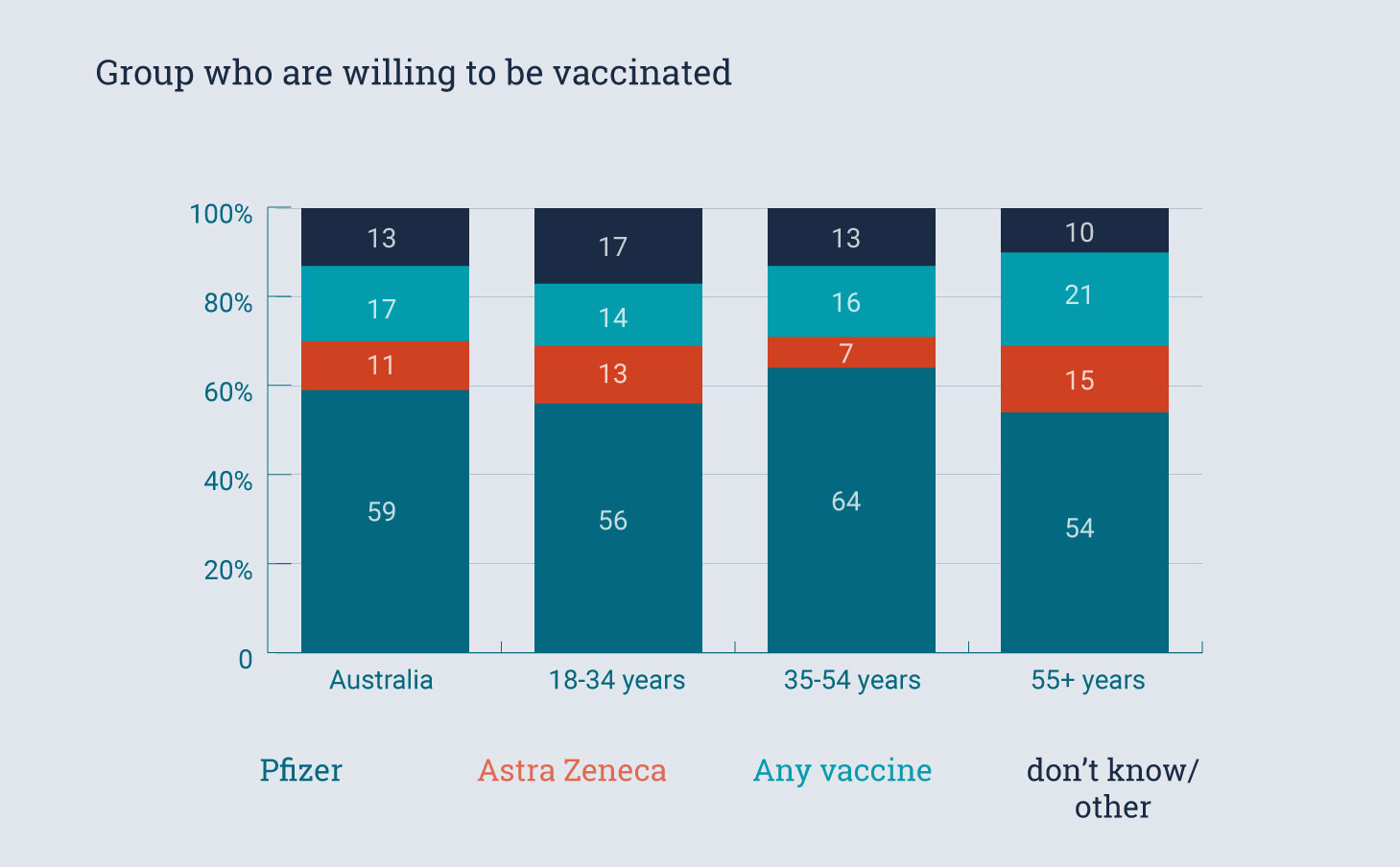
Of the group who were willing to be vaccinated (Fig. 1b), the majority (71 per cent) reported that they would like to be vaccinated as soon as they are eligible.
Again, there was a clear preference for Pfizer over AstraZeneca, but for those willing but yet to be vaccinated, the preference for Pfizer was across all age groups. Note though, that more than 10 per cent are uncertain about which vaccine to pick.
Offering some form of cash incentive has been suggested as a way to speed up the vaccination rollout. We asked this question to two groups. Group 1 includes those willing to be vaccinated but who prefer to wait (15 per cent). Group 2 includes those not willing to be vaccinated or those who don’t know whether they want to be vaccinated (30 per cent).
Figure 2: If you were paid a cash incentive would you get vaccinated as soon as possible?
For the group willing to wait to be vaccinated, there was some indication that a cash incentive could speed up the vaccine rollout.
However, for the majority of those not willing or who don’t know about being vaccinated, offering a cash incentive would not change their responses.
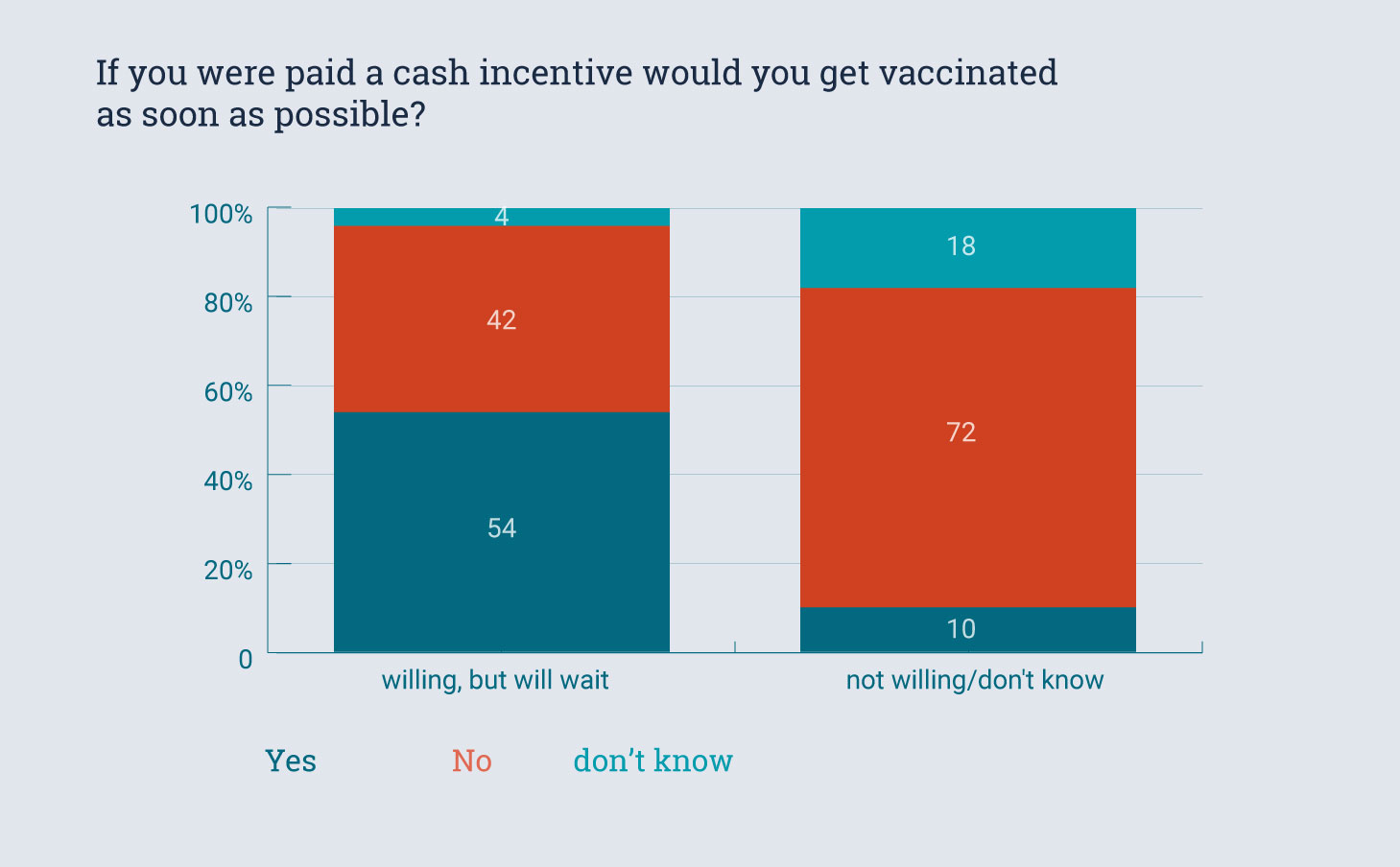
Survey reports divided views about linking vaccination with international travel
About 59 per cent of Australians said that the government should consider the take-up rate of the COVID-19 vaccine in Australia when deciding when to allow international travel into and out of Australia without restrictions. When asked about the percentage of the Australian population who should be vaccinated before international travel reopens, many suggested a take-up rate between 50-100 per cent, giving a sample (weighted average) vaccine take-up rate of about 78 per cent.
The remaining responses were evenly divided between those not for, or unsure of, the linking of vaccination take-up rate and international travel.
Most Australians support travel for vaccinated residents, but with quarantine in place.
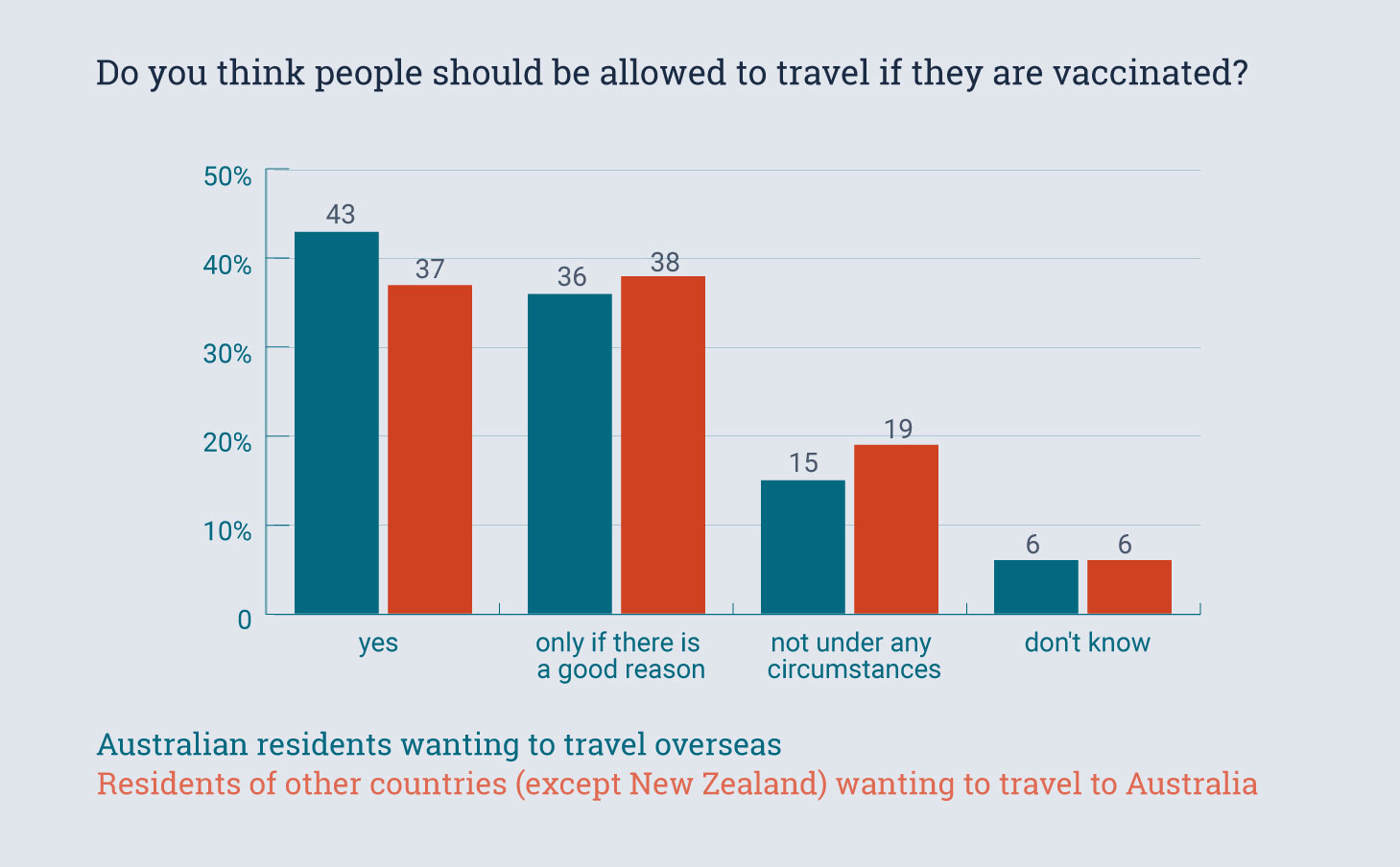
Figure 3: Reasons for travel out/into Australia, and quarantine programs on returning/entering Australia
When asked: If a resident of Australia had a COVID-19 vaccination, should they be allowed to travel? (Fig. 3a), 79 per cent said yes. However, almost half of those respondents qualified this by saying “only if there was a good reason”.
Responses were similar when asked about vaccinated residents of other countries wanting to travel to Australia.
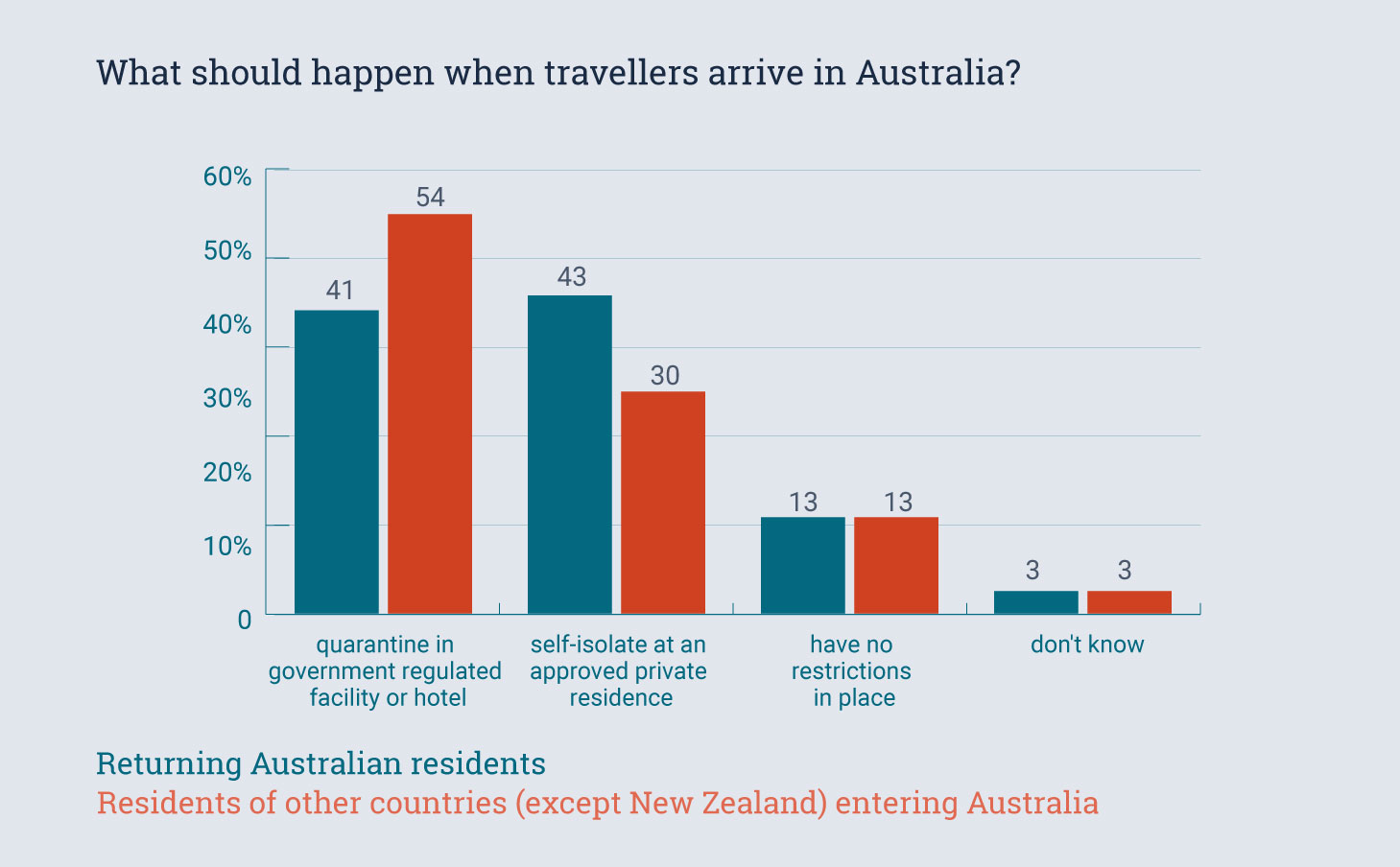
There is strong support for the practice of quarantining in a hotel or government regulated facility or self-isolating at an approved private residence, even if the traveller is already vaccinated. (Fig. 3b)
This applied to both returning Australian residents as well as to residents of countries other than New Zealand, entering Australia.
For more analysis about the vaccine roll out, see:
- So you don’t want the COVID-19 vaccine? Here’s what research shows will change your mind. (by Dr.Dajung Jun and Professor Anthony Scott)
- Why is Australians’willingness to be vaccinated falling, and what can we do to increase it? (by Professor Anthony Scott)
- Should we pay Australians to get Vaccinated? (by Professor Anthony Scott), Pursuit, University of Melbourne
Victoria is not a stand-out State in terms of policy dissatisfaction nor attitudes to the vaccine rollout.
Our latest survey was conducted in the week when Victoria was in lockdown. Yet, there is no clear survey evidence that Victorians are significantly more dissatisfied with government policy, more concerned about the vaccine rollout, more financially stressed, or mentally distressed.
Figure 4: Policy Satisfaction, Vaccine Rollout, Financial Stress and Mental Distress Australia, NSW, VIC, QLD, SA and WA (proportions,%)
* The survey contains responses from 1200 persons, aged 18 years and over. The sample is stratified by gender, age and location to be representative of the Australian population.
+ Financial stress refers to the situation of having difficulties paying for essential goods and services while financial vulnerability refers to being in financial stress or making ends meet.
++ The question about feeling depressed is about assessing symptoms/experiences and not about assessing the presence of a clinical diagnosis or disorder. The responses are calibrated on a 5-point scale covering: all, most, some, little, none of the time.
This report was written by Professor Guay Lim and Dr. Viet Nguyen
© The University of Melbourne – Melbourne Institute: Applied Economic & Social Research, 2021. This work is copyright. The material may be reproduced and distributed for non-commercial purposes only, subject to the inclusion of an acknowledgment of the source(s).